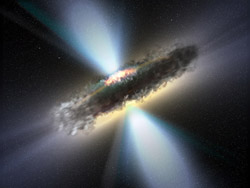 October 13, 2011
October 13, 2011
In the last 40 years we discovered water in space. We expect to find much more water deep on the moon, Mars, and elsewhere. Water on Asteroid 24 Themis closely matches our ocean water. Scientists speculate that much of earth’s water wafted in from comets and maybe it’s still coming. However, if so, why don’t satellites coat with ice? The whopper? A cloud around Quasar APM 08279+5255 containing 140 trillion times as much water as earth’s oceans, but it’s 12 billion light years away, a long walk for a drink.
For practical purposes, we’re stuck on earth, a finite-sized speck in the universe. Call it Spaceship Earth. The only resources coming in are solar radiation, some water, and meteors. Fresh water we can easily use constitutes less than 0.2% of all water on earth, and we manage to pollute and dispute a big share of that. Looking behind the news, water and the food grown with it factor into a great deal of human conflict.
Fresh water shortages or deluges are local issues, but if used wisely, most currently habitable areas have enough water to live on. Unfortunately, wise use isn’t instinctive. Sudan is a case in point. Water squabbles in the United States are trivial by comparison. Sudan suffers more from water stress and misuse than shortages. It uses 97% of its water for agriculture, and many Sudanese health crises can be traced to contaminated water.
To fix this, high-tech might help, but it does not address the core problem, human attitudes: fighting instead of cooperating, thinking that the only solution is more water in total, or for self-interests in particular. By becoming more imaginative and cooperative, Sudanese could easily make better use of the water now available. Almost all outsiders grasp that, but embroiled in enmities, local antagonists think that all would go better if only they were in full control of it.
Sudan illustrates the human challenge of Compression Thinking. Sudanese can’t see that all share the same water sources and act on it. At any local action level, an even more abstract perception is that we’re merely one corner of a finite Spaceship Earth.
When this fully sinks in, our thinking nearly turns upside down, but none of us upend our thinking quickly. Until then we want to fight, maximize, and win, disregarding the sorry consequences of winning. Insight may be delayed if we must live by a financial system based on endless growth.
However, a few people have begun to see that a financial world that assumes endless growth is transitioning toward a zero sum game, while flogging a dying horse to go faster. If you’d like a financial view of what is happening without the physical view of Compression Thinking, read Extreme Money or The Great Crash Ahead.
